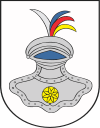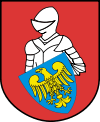Mikołów
| Mikołów | ||
|---|---|---|
|
Market Square and Town Hall | ||
| ||
 Mikołów | ||
| Coordinates: 50°10′N 18°54′E / 50.167°N 18.900°E | ||
| Country |
| |
| Voivodeship |
| |
| County | Mikołów County | |
| Gmina | Mikołów (urban gmina) | |
| Established | 13th century | |
| Town rights | 1547 | |
| Government | ||
| • Mayor | Stanisław Piechula | |
| Area | ||
| • City | 79.2 km2 (30.6 sq mi) | |
| Population (2008) | ||
| • City | 38,821 | |
| • Density | 490/km2 (1,300/sq mi) | |
| • Urban | 2,746,000 | |
| • Metro | 5,294,000 | |
| Time zone | CET (UTC+1) | |
| • Summer (DST) | CEST (UTC+2) | |
| Postal code | 43-190 to 43-197 | |
| Area code(s) | +48 32 | |
| Car plates | SMI | |
| Climate | Dfb | |
| Website | http://www.mikolow.eu | |
Mikołów [miˈkɔwuf] (German: Nikolai, Silesian: Mikołůw) is a town in Silesia in southern Poland, near Katowice. Borders on the Upper Silesian Metropolitan Union - metropolis with the population of 2 millions. Located in the Silesian Highlands, on the Jamna stream (tributary of the Kłodnica and indirectly Odra river).
It is situated in the Silesian Voivodeship since its formation in 1999, previously in Katowice Voivodeship, and before then, of the Silesian Voivodeship. Mikołów is one of the towns of the 2,7 million conurbation - Katowice urban area and within a greater Silesian metropolitan area populated by about 5,294,000 people.[1] The population of the town is 38,821 (2008).[2]
It was first mentioned in writing in the year 1222.
History
With a written mention from 1222, Mikołów is one of the oldest towns in Upper Silesia. This was a document sent by duke of the Racibórz Casmir (the son of Mieszko the Raciborian) to the bishop of Wrocław, Wawrzyniec. In the document was written the name of Andrew (Lat. comes Andreas, castellanus de Miculow), the castellan of Miculow, showing that Mikołów was already an administrative center.
Mikołów became the center of local trading, located on crossroads of trading roads. The Black Death killed 33% of the town's inhabitants in 1349-50. In the period 1433–1443, there were several earthquakes in the area. In 1545 Mikołów gained city status. In 1645 and 1687 few fires burnt tenements near the market place and in connection with that Mikołów achieved the right to expose four fairs a year. In the second half of the 18th century peasants few times opposed the ruler and paying high serfdomes. Additionally in between 1713-15 the city survived a famine bringing epidemics. In 1760 the name "Mikołów" was used first time in the originally form. On 20 May 1794 a huge fire disaster burnt whole houses around the market square, including the town hall and all historical documents stored inside.
Jewish history
The first Jews appeared in Mikołów in 1674, establishing an inn. The synagogue in Mikołów was established in 1816. There was about 800 Jews in the town in the second half of the 19th century. Since then the number of Jewish inhabitants little by little has been lowering down to the level of 243 before the Second World War. Just before the liberation by Soviets in January 1945, prisoners from Auschwitz had marched through Mikołów to Germany to work in labour camps. They were totally exhausted and weak, most of them were at the death's door. In Mikołów over 60 people died or were murdered and then buried in Jewish cemetery. Among the prisoners were also some Catholics. In 1972 the communist authority ordered the miners from the coalmine Bolesław Śmiały to detonate the Synagogue.
The Jewish cemetery in Mikołów was established at the end of the 19th century, but the oldest tomb dates back to 1726. Only 100 of 265 tombs are preserved. In the front of the cemetery is the memorial, dedicated to the victims of January 1945. On the memorial there is written: "In this place rest in peace 14 people shot up on 16 January 1945 by Schutzpolizei officers, and 50 prisoners from the concentration camp in Auschwitz, murdered on 19 January 1945 during evacuation of the camp by Germans. Glory to them"
In Mikołów there was also located another-older Jewish cemetery (1682) but during the Second World War it was completely ruined.
Districts
Apart from the town proper Mikołów has one distinct district (Kamionka) and 5 sołectwos:[3]
People
- Anna Dereszowska
- Eugeniusz Wycisło
- Izabela Kloc
- Ignaz Wechselmann
- Joseph Abraham Steblicki
- Rafał Wojaczek
- Roksana Jonek - Miss Polonia 1997
International relations
Twin towns — Sister cities
Mikołów is twinned with: Beuningen, Sainte-Geneviève-des-Bois, Klimkovice
References
- ↑ European Spatial Planning Observation Network (ESPON)
- ↑ Population. Size and structure by territorial division - Central Statistical Office in Poland ISSN 1734-6118, Warsaw, May 2009
- ↑ "Jednostki pomocnicze" (in Polish). Retrieved 2015-05-06.
External links
| Wikimedia Commons has media related to Mikołów. |
- Mikołów government website
- Jewish Community in Mikołów on Virtual Shtetl
Coordinates: 50°10′N 18°54′E / 50.167°N 18.900°E

